The big issue with 'Big Formula:' Americans want paid parental leave, the formula industry says it's bad for business
Stacker explored how the baby formula industry's outsized influence on policy has contributed to Congressional resistance to federally mandated parental leave policy.

You've probably heard of Big Pharma, Big Oil, Big Tobacco, and even Big Sugar. But how about Big Formula?
Infant formula is a billion-dollar industry with an insular market. Only a handful of companies—led by Abbott, Mead Johnson (a subsidiary of Reckitt), Nestlé, and Perrigo—produce most baby formula sold in the United States. To protect their market share, they've spent millions of dollars in Washington D.C., lobbying for their interests, which include resisting a federally mandated family leave policy.
Stacker explored the formula industry's outsized influence on policy by comparing breastfeeding rates around the country, analyzing state-level mandatory family leave policies, and documenting the storied history of Big Formula's lobbying efforts.
Breast milk is considered an ideal food for infants because it is packed with nutrients and antibodies that protect against illness. Although health organizations, including the American Academy of Pediatrics, widely consider exclusive breastfeeding for the first six months of life optimal for infant health and the well-being of new mothers, just 1 in 4 babies in the U.S. breastfeed for this duration, according to Centers for Disease Control and Prevention data.
Formula serves an essential role in supplementing or replacing breast milk when breastfeeding is impossible. Myriad factors—including but not limited to lactation challenges —can render formula a necessary component of a baby's health and well-being, when and if human milk is no longer available. Data also shows that breastfeeding journeys are too often truncated by a working parent's limited or lack of family leave—and even, in many cases, by crafty formula marketing campaigns that convey formula as a simpler decision.
Editor's note: While this story centers on pregnancy, we acknowledge that not all people who can become pregnant identify as women or mothers.
You may also like: 9 discoveries about the adolescent brain that transformed our understanding of teen substance use
Breastfeeding rates across America reveal distinctions, disparities
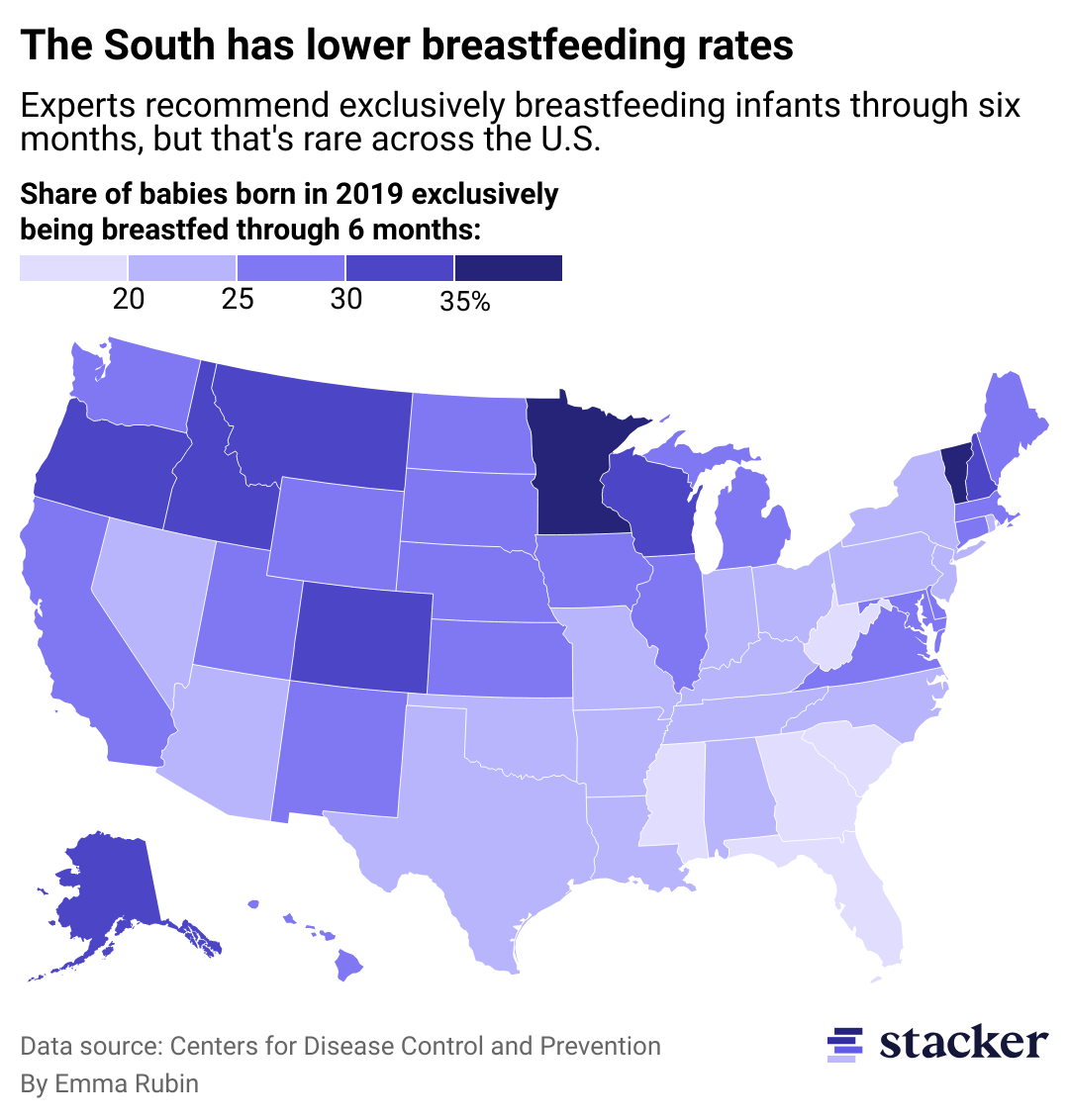
Among infants born in 2019, around 83% of infants received some breastmilk at birth, but by 6 months of age, a little more than half were receiving any breast milk, while about a quarter were receiving breast milk exclusively.
Roughly 20% of mothers living in the Southeast breastfeed till six months. Meanwhile, more than 32% of mothers in Oregon, Montana, Minnesota, Colorado, and Vermont breastfeed through the same period. Notably, these states are among those with some version of mandatory family leave policies, while Southeastern states with the fewest mothers breastfeeding till six months—including Mississippi, Alabama, Florida, Georgia, and South Carolina—do not. Even in states with mandated family leave policies, those policies are not always paid.
Variations in breastfeeding rates throughout the nation reveal the impacts of individual state policies for parental leave. How much or how long someone breastfeeds also depends on their family dynamic, at-home support, the number of children in the house, and their level of education. A review of studies published in a 2023 issue of the journal Midwifery shows that lacking knowledge or confidence can contribute to lower rates of breastfeeding in terms of initiation and duration.
Breastfeeding rates also diverge along racial and economic lines. Non-Hispanic Black infants are less likely to be breastfed at all compared to their counterparts, and infants who are eligible to receive nutritional support through the Special Supplemental Nutrition Program for Women, Infants, and Children, known as WIC, are less likely to be breastfed than infants who are ineligible for these services. What's more, young mothers aged 20-29 are less likely to breastfeed than mothers 30 and older.
Many mothers from marginalized communities face numerous obstacles to meeting breastfeeding goals, including but not limited to unsupportive hospital practices and policies, and a lack of insurance coverage for support services like pregnancy education, lactation consultants, and doula services.
Breastfeeding is also expensive. The annual cost of formula is $2,280, whereas breastfeeding for one year may run more than $10,500 in direct and hidden costs, according to a 2023 study from the Yale School of Medicine. These expenses include higher food intake for nursing parents, vitamin supplementation, breastfeeding or pumping supplies, and, crucially, time.
For families living at or below the federally established poverty threshold—$25,820 for a family of three—spending nearly $11,000 to breastfeed isn't feasible. This is especially true when WIC, which does provide breastfeeding support, is the nation's largest purchaser of infant formula. Each state contracts with a single brand of infant formula provided through state WIC agencies, which competitively bid rebate contracts with formula manufacturers and pass those savings (or free formula) along to new parents.
Returning to work can also stymie breastfeeding for full-time working mothers, who tend to breastfeed for shorter periods than their part-time or unemployed counterparts. Hourly wage workers face even more significant barriers than white-collar workers: They have less control over schedules set by managers, and their employers may dock their pay for pumping breaks.
Higher rates of breastfeeding correlate with mandatory parental leave
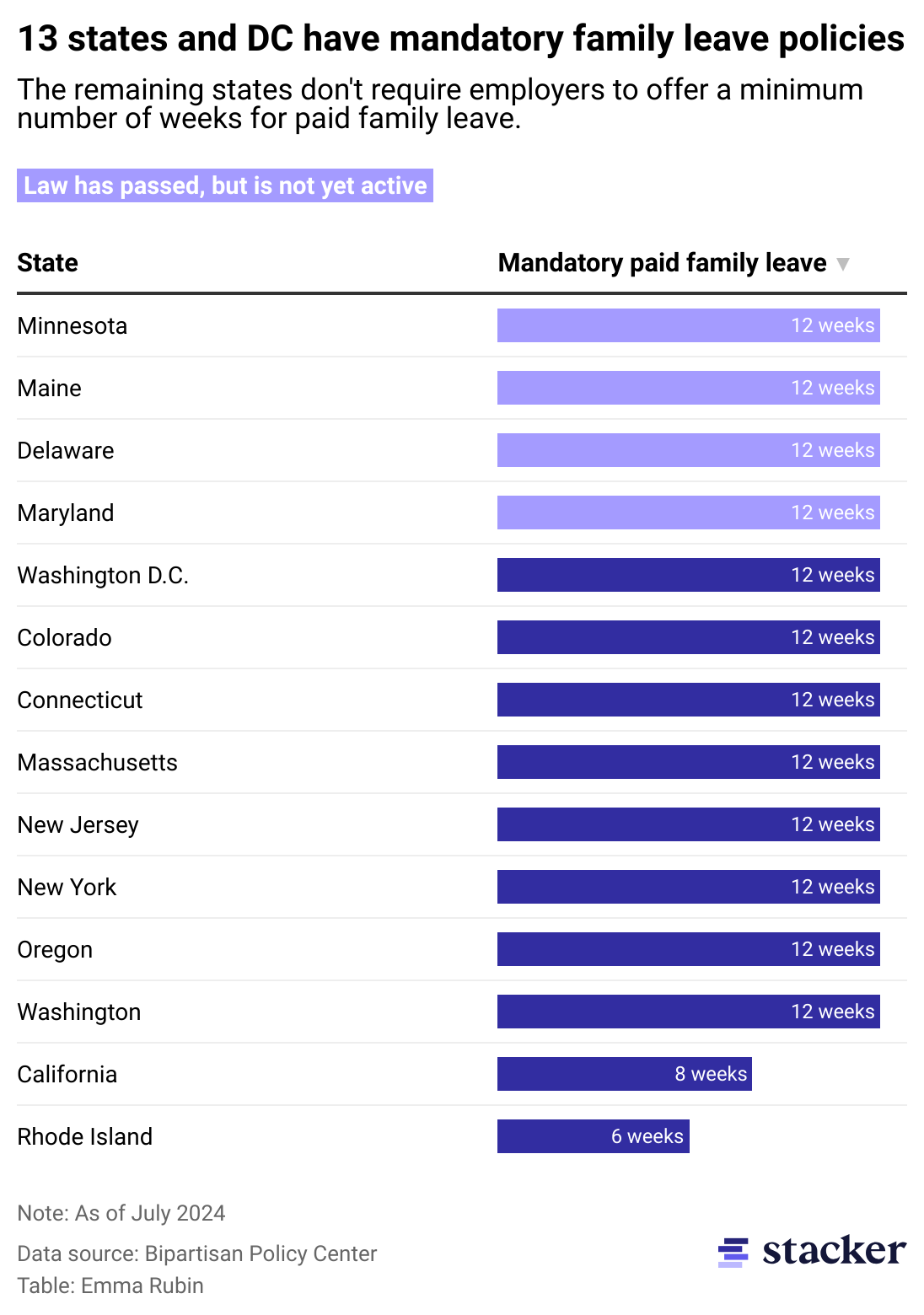
The United States is the only wealthy nation without a mandated national leave policy and one of just six countries lacking such a policy worldwide, according to data compiled by the Organisation for Economic Co-operation and Development. The country is also an outlier in fundamental aspects of maternal health, with the highest maternal and infant mortality rates among developed nations, subpar reproductive outcomes, and a lack of universal or affordable health care for pregnant people.
How aggressive formula marketing turned exploitative
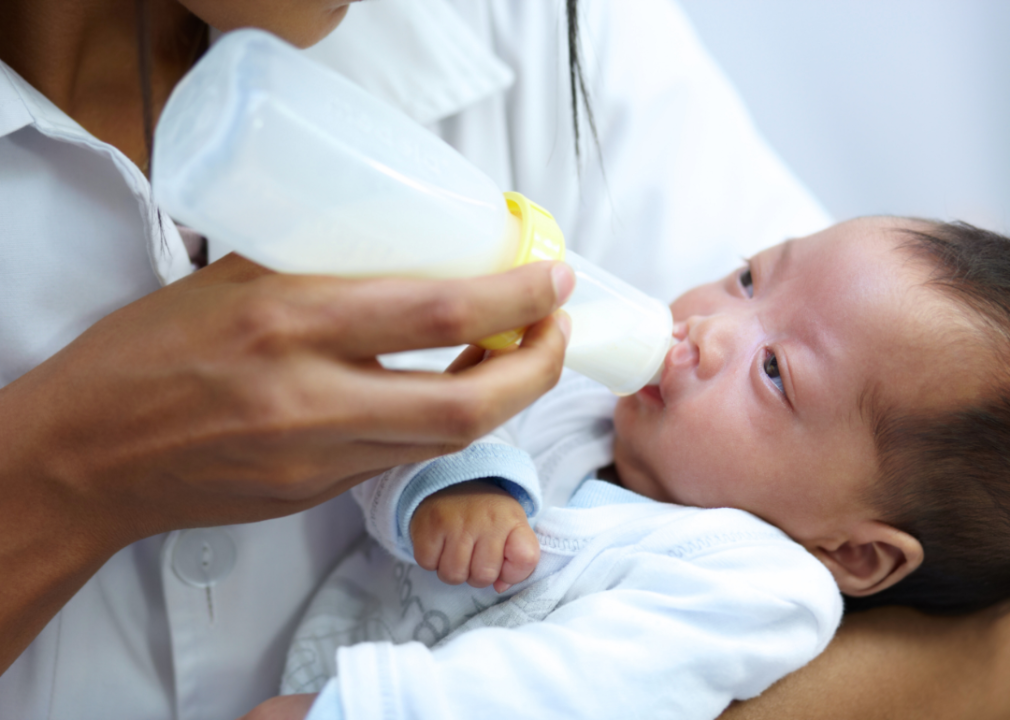
Recent social media and pop culture "mommy wars" between breastfeeding and formula have framed this choice as having a clear right and wrong, when the reality is more complex. Individuals may weigh several factors when determining how to feed their infant; the influence of pervasive digital marketing for formula complicates these decisions.
While the American commercial milk formula industry has long been criticized for aggressive marketing tactics, a groundbreaking 2023 report published in the Lancet argues the industry has become exploitative. The report's authors, a group of medical professionals, detailed how the industry promoted unsubstantiated claims in its marketing that linked typical baby behaviors to breastfeeding.
Dubious claims that baby formula improves sleep and digestion, reduces fussiness, and fosters brain development targeted parents' biggest fears and concerns. Formula was touted as the practical alternative to "generic, outmoded, and anti-feminist" breastfeeding, the report stated. The paper also cited the massive influence of digital media on the promotion and sale of infant formulas.
Notably, the U.S. does not regulate formula industry marketing, while many other countries do, nor did it commit to the World Health Organization's globally accepted International Code of Marketing Breast-Milk Substitutes, which set a precedent in 1981 to prohibit formula marketing.
It wasn't until the late aughts that hospitals began to stop sending new parents home with free samples of formula, a practice many surmised would tempt an exhausted, sore breastfeeding parent to stop the practice before the recommended six months—particularly if they had to return to work. More recently, infant formula manufacturers found a workaround: They inundated expecting and new mothers with ads on social media touting formula's ability to get babies to sleep better and gain weight.
New parents are often sleep-deprived and anxious. The vast majority of them want the very best for their babies—and messaging that taps into these emotions can be powerful—and, at times, predatory. New parents are at times desperate to ensure the well-being and survival of both themselves and their babies' which is made even more difficult without access to maternity leave.
Big Formula's lobbying efforts to limit—or eliminate—parental leave
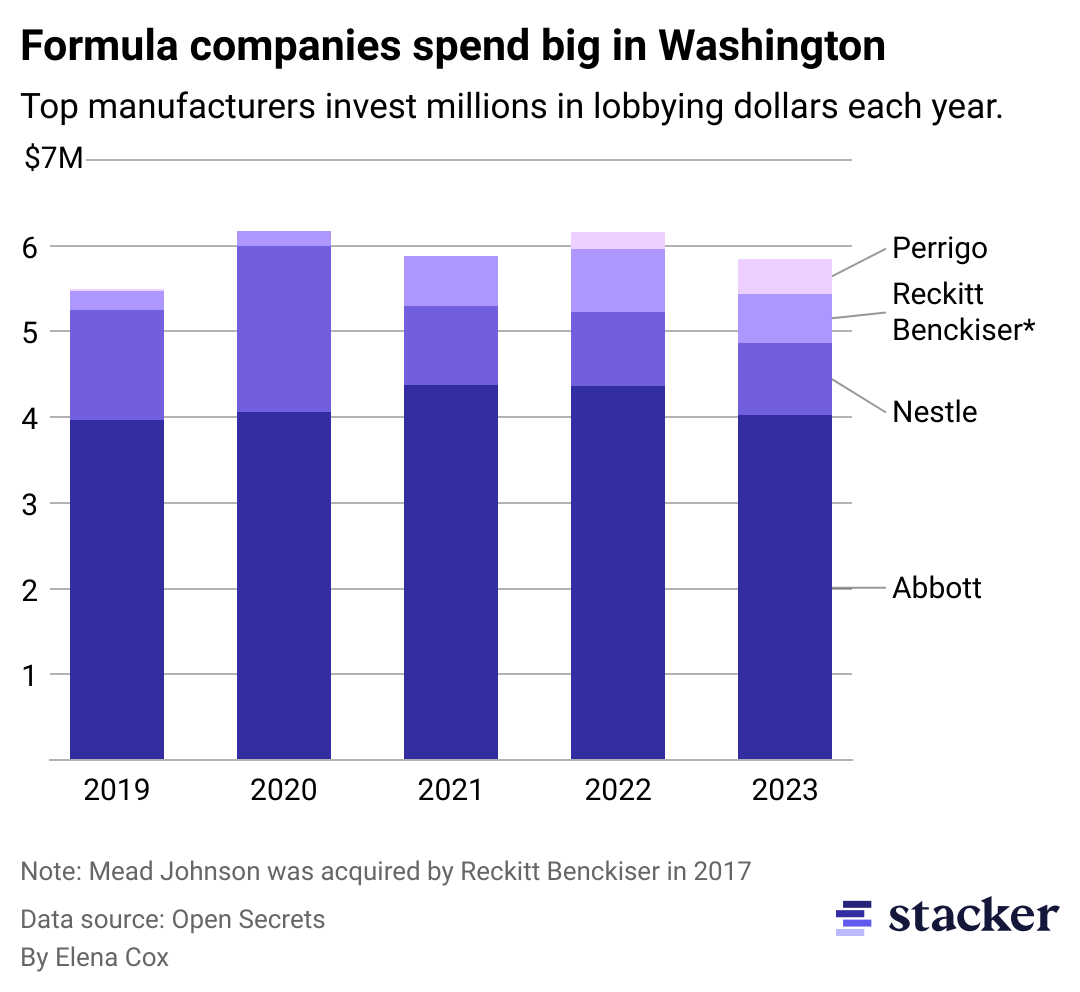
Federal maternity leave was introduced into political debate as a legally protected necessity 105 years ago, in 1919. Since then, at least eight attempts to pass federally protected family leave have failed, including the recent Momnibus Act, supported by 72% of people in a survey of 999 registered voters conducted by Navigator in 2022.
Despite overwhelming support, thwarted attempts to pass a paid leave policy are partly the result of the decades-long relationship between formula industry giants and the U.S. government. These types of relationships are not uncommon—lobbying has been part of American politics since the nation's founding—but they continue to evolve with the times.
A 2020 analysis in the International Breastfeeding Journal found that Nestlé had actively cultivated relationships with key opinion leaders and spread misinformation through digital media that would benefit the formula industry. Abbott, for example, disclosed more than $4 million spent in lobbying dollars in 2021 and $1 million in the first three months of 2022 alone.
Special interest groups use political contributions to incentivize legislators to make decisions favoring their corporate interests. These groups, or lobbies, negotiate behind closed doors, meaning that despite required disclosures, the public often remains in the dark. By currying favor among lawmakers, lobbyists have long helped powerful businesses expand their influence through tax breaks by sidestepping regulations, securing government contracts—and even altering public policy.
Notably, both parties are susceptible to these forces. A ProPublica investigation found that the Biden administration pushed back against formula regulations around the world designed to protect public health.
Despite resistance to maternal health and family leave policies among some factions, there is unwavering support among advocates. In 2022, Sen. Tammy Duckworth (D-IL), a known champion of reproductive rights and maternal health, sent a letter to the Infant Nutrition Council of America on price gouging during the formula shortage, noting the formula shortage's "adverse impact on public health."
Coincidentally, the INCA is led by Abbott, Mead, Nestlé, and other formula companies. It's a case in point of lobbyists' outsized influence ever since Citizens United was passed in 2010, overturning a statute that rendered private spending by for-profit corporations in elections illegal.
A formula shortage, a missed opportunity, and soaring profits
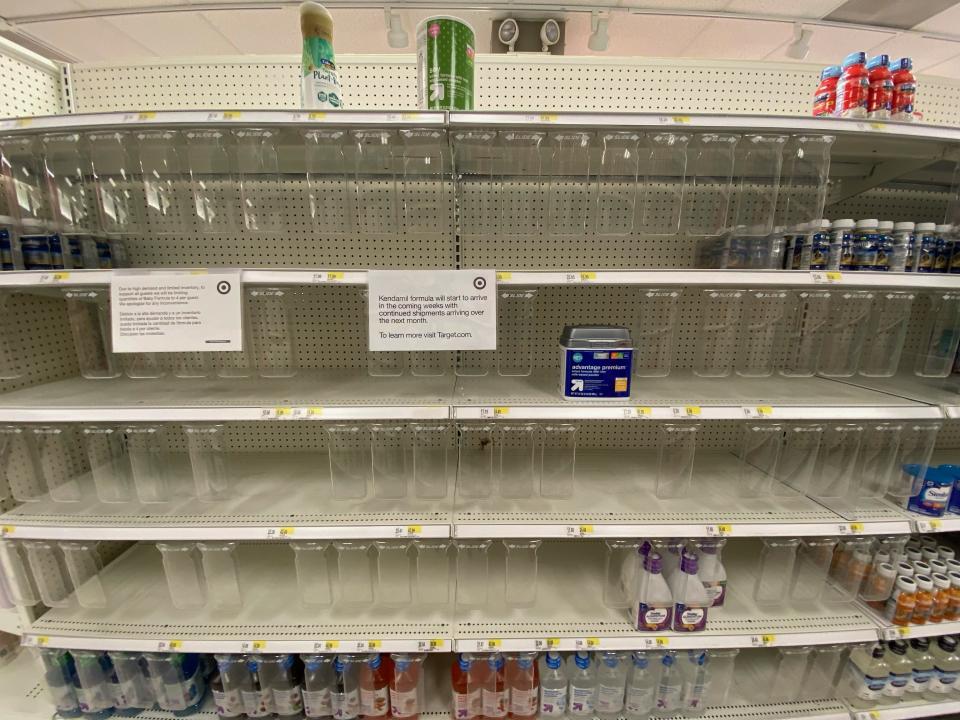
Subsequently, in February 2022, the nationwide formula shortage due to the closure of an Abbott plant for suspected contamination revealed just how wrong things can go when a small number of companies dominate an entire industry.
By May of that year, formula prices had spiked more than 11% since March 2021, according to a DataWeave analysis, with 43% of all formula products unavailable as of May 8, 2022, per Datasembly. The shortage hit Iowa, the Dakotas, Missouri, and Texas—states without mandatory family leave policies—particularly hard. Formula prices rose, capitalizing on demand and sending profits soaring. The industry's profit margin spiked nearly 3% from 2021-2022, reaching 14.2%—its highest point since 2015, according to IBISWorld data via Axios.
The formula shortage also drove parents to seek unconventional alternatives. Those with means tapped the baby formula black market, which carried health risks, while others resold formula on Facebook at inflated prices. Some breastfeeding parents pumped extra breast milk and donated it to those in need. Calls for parents to "just breastfeed" during formula scarcity overlooked the fact that breastfeeding is not as sustainable or practical for as many people as it could be.
The Access to Baby Formula Act was introduced just after the shortage to protect access to formula. The bill gave the USDA authority to waive existing contracts so people who utilized WIC benefits would be allowed an alternative in the event of another recall or supply chain disruption. Advocates cited the crucial need to maintain supply to meet demand.
The Access to Baby Formula Act passed unanimously in the Senate in May 2022. In the House, however, nine Republicans voted against the bill, many citing big government overreaches. However, a closer look at the voting record reveals a more nuanced story.
A Stacker analysis of Federal Election Commission data found that seven of the nine representatives who voted against the bill received more than $500,000 in combined campaign donations in 2022 from groups affiliated with the House Freedom Caucus.
Notably, lobbying activity for "infant formula" increased immediately following the shortage. Two dozen lobbying entries related to "infant formula" appeared from April through June 2022, up from two entities between January and March of the same year. Three of the six who abstained from voting had received campaign money that year from Abbott, according to an Open Secrets analysis of FEC data.
Ultimately, the Access to Baby Formula Act passed—but many reproductive rights advocates considered the legislation limited. It didn't go far enough to address systemic barriers and structural inequalities in maternal health care, like equitable postpartum support, access to clinical care, and comprehensive breastfeeding support. The shortage highlighted how these intractable systemic barriers create individual obstacles for new mothers—and how formula companies benefit from these struggles.
As of early 2024, despite the disastrous shutdown, Abbott was back on top as the market leader in baby formula.
You may also like: Why does student mental health suffer during summer? Here's what the data says
Breaking away from misleading and unethical formula marketing

On the cusp of one of the most consequential presidential elections in the country's history, federally mandated parental leave is one pivotal issue bringing Americans to the polls.
A 2023 survey from the Democratic polling firm Lake Research Partners found that nearly two-thirds of voters in battleground states would be motivated to vote by a paid leave plan. The poll, taken on behalf of the advocacy group Paid Leave for All Action, also found that support for paid leave is bipartisan: 85% of Democratic voters and nearly half (47%) of Republicans said they would vote for a candidate who supports a paid leave policy.
Despite overwhelming support for paid leave, historically, just a handful of votes in Congress have denied plans. The most recent and comprehensive effort, the Momnibus Act, was part of President Biden's Build Back Better initiative, a sweeping proposal that included $585 billion for family and child programs. Among the pieces of the initiative cut were $200 billion for a federally mandated, four-week parental leave program and $270 billion for six years of a childcare subsidy program.
Proponents of federally protected parental leave argue families would be better equipped to decide what infant feeding path best suits them with postpartum recovery coverage. Detractors cite the high costs; studies show that investing in parental leave (including increased breastfeeding support) will create billions in savings over the long term due to improved public health outcomes overall.
Government support for family leave shows a direct correlation to higher breastfeeding rates, which equates to better health outcomes for the nursing parent and infant. In Brazil, breastfeeding legislation enacted post-pandemic—including comprehensive access to maternity leave, health care coverage, and milk donation—led to a significant increase in the percentage of infants breastfed in the first hour after birth. Roughly 46% of babies born in Brazil today are still exclusively breastfeeding at six months, compared to about a quarter of infants in the U.S.
In Kenya, laws requiring all employers to support breastfeeding mothers—including flexible schedules, private spaces for nursing, and refrigeration for expressed milk—have positively impacted health outcomes and workplace engagement.
When the Kenyan Parliament passed the Health Act 2017, which also prohibited the marketing of breastmilk substitutes, the legislation contributed to a significant rise in breastfeeding, from 32% in 2008 to 60% in 2022. Among some employers in the West African nation's vast agricultural industry, initiatives that support new mothers have also increased retention and improved worker satisfaction.
One study of 570 Kenyan infants conducted by researchers from the African Population Health and Research Center showed a direct correlation between exclusively breastfeeding from 3 to 6 months and developmental benefits and increased protection against common childhood illnesses.
In Vietnam, Sierra Leone, Pakistan, and Serbia, the implementation of parental leave policies to support breastfeeding parents also corresponded with an increase in breastfeeding rates. What's more, breastfeeding rates have gone up in countries that strictly enforce the WHO's suggested oversight for formula marketing. Regulatory measures, including nondescript packaging for formula, more stringent product development requirements, and prohibiting the sale or marketing of formula in breastfeeding stations, are all part of comprehensive enforcement.
Many countries consider access to resources to safely feed and raise children without undue marketing influence a basic human right. The well-established link between breastfeeding support, maternity leave, and improved health outcomes for infants and new mothers may buoy future legislation protecting family leave policies and stricter rules for formula marketing.
In light of the century-long efforts to implement mandated parental leave, advocacy work in favor of or against family leave policies could tip the scales in the 2024 presidential election.
Additional writing and story editing by Alizah Salario and Nicole Caldwell. Copy editing by Kristen Wegrzyn.
Comments





